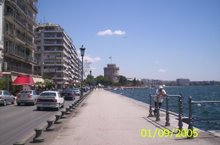Before the military dictatorship, George Mavros was one of Greece's leading politicians, serving as Cabinet minister in several different governments. Arrested five times during the junta's seven years, Mavros last March was finally sent to the infamous Gyaros Island, where the military regime's most prominent foes coexisted with snakes, scorpions and rats. Now Mavros, 65, a Hellenistic blend of bluntness, sensibility and humor, is the No. 2 man in the new civilian government of Constantine Caramanlis, with portfolios as both Deputy Premier and Foreign Minister. Last week, in an interview with TIME's chief European correspondent William Rademaekers, Mavros explained why Athens is so bitter toward the U.S. and what it plans to do next.
ON GREEK-AMERICAN RELATIONS: The serious deterioration began with the American attitude toward the Greek dictatorship. Washington took a position toward the colonels that could not possibly be considered unfavorable, negative or even neutral. The reason was shortsighted, serving American strategic interests. The American Government cooperated with the military regime in Greece and supported it in practice. A few platonic statements about "liberalization" of the regime did not alter this reality. Considering this background and the widespread public resentment [it caused] in Greece toward the U.S., it was inevitable that Washington's attitude during the recent events in Cyprus would create a crisis in Greek-American relations. Put bluntly, we believe that the Americans were able to stop the Turks from landing on Cyprus, but it is now obvious that they were rather unwilling to do so.
ON THE ROLE OF THE CIA IN GREECE: It is a general conviction in the country that since the military takeover of April 21,1967, the American CIA has been behind the scene. Your secret services are deeply connected with our secret services for NATO purposes and other security reasons, and nothing happens [in Greece] that the American CIA does not know about. The 1967 coup was engineered by the Greek counterpart of the American CIA. There is no doubt about U.S. awareness of what was happening, and I think it would be better for the Americans to confess that it was an error for them to have been involved. Now the question is: Who was behind the Cyprus coup that overthrew Makarios? Evidence is difficult to get, so it is anybody's guess. People naturally suspect those who have backed the tyranny of the past seven years.
ON HENRY KISSINGER: I cannot say that we are very enthusiastic about the way he dealt with the problem. Between the two phases of the Geneva Conference, I knew that the Turkish plan was to gain some time. The Turkish plan for the military occupation of Cyprus—a plan involving some 300 tanks, 40,000 troops and masses of heavy artillery—was not dreamed up overnight. It was a plan to conquer Cyprus that was already in existence. It was an expansionist Turkish military plan. I knew that. Two days before the second phase of the Geneva Conference, I asked Kissinger if he would see me to discuss the situation.
He answered immediately that he was sending [Assistant Secretary of State for European Affairs] Arthur Hartman to Ankara, Cyprus and Athens and if I was not satisfied with the talks, he would be prepared to see me on Thursday, Aug. 8. That also happened to be the opening day of the second phase of the Geneva Conference. The thought was to see him on the morning of Aug. 8,then fly to Geneva that evening. This seemed to me to be impossible, so I dropped the idea.
ON WITHDRAWING FROM NATO: Our decision is not a bluff. The alliance proved to be unable to prevent a military conflict between two member countries. What use is it? Everybody in Greece wonders how this alliance can protect us from outside aggression if it cannot prevent aggression from within.
We know very well what Greek withdrawal means to the status of the Western world. It is ridiculous to think that Turkey can fill the gap. Without Greece, the entire Western strategy—the entire defense structure—will crumble. Can you imagine what would happen if Greece fell [to the Communists]? Italy and Turkey would fall in the same afternoon, and the lives of 300 million Europeans would be at stake. But we Greeks cannot bear alone the responsibility for the security of the Western world at a time when we are so bluntly attacked by a member of the Atlantic Alliance and the other members of this alliance are simply looking on. Greece had no other alternative but to withdraw from the military branch of the NATO alliance.
ON THE ROLE OF THE SOVIET UNION IN THE CRISIS: We agree with Russia's idea [for an 18-nation conference on Cyprus] in principle, but we do not want a new forum for propaganda. What we need is concrete action. For example, Greece would have no objection to withdrawal of all its forces from Cyprus, but under firm guarantees that Turkish military forces would be withdrawn.
ON BRINGING FORMER JUNTA LEADERS TO TRIAL: The Greek people insist that there must be an accounting. The question is one of timing. This is a provisional government, if you will. We must move one step at a time. We have achieved the direction toward democracy. Politics is something that must be carefully done. Therefore, my feeling is that once we have elections and there is a government of the people, that government will certainly want to bring to justice those who have committed crimes during seven years of dictatorship and tyranny in this land.




No comments:
Post a Comment